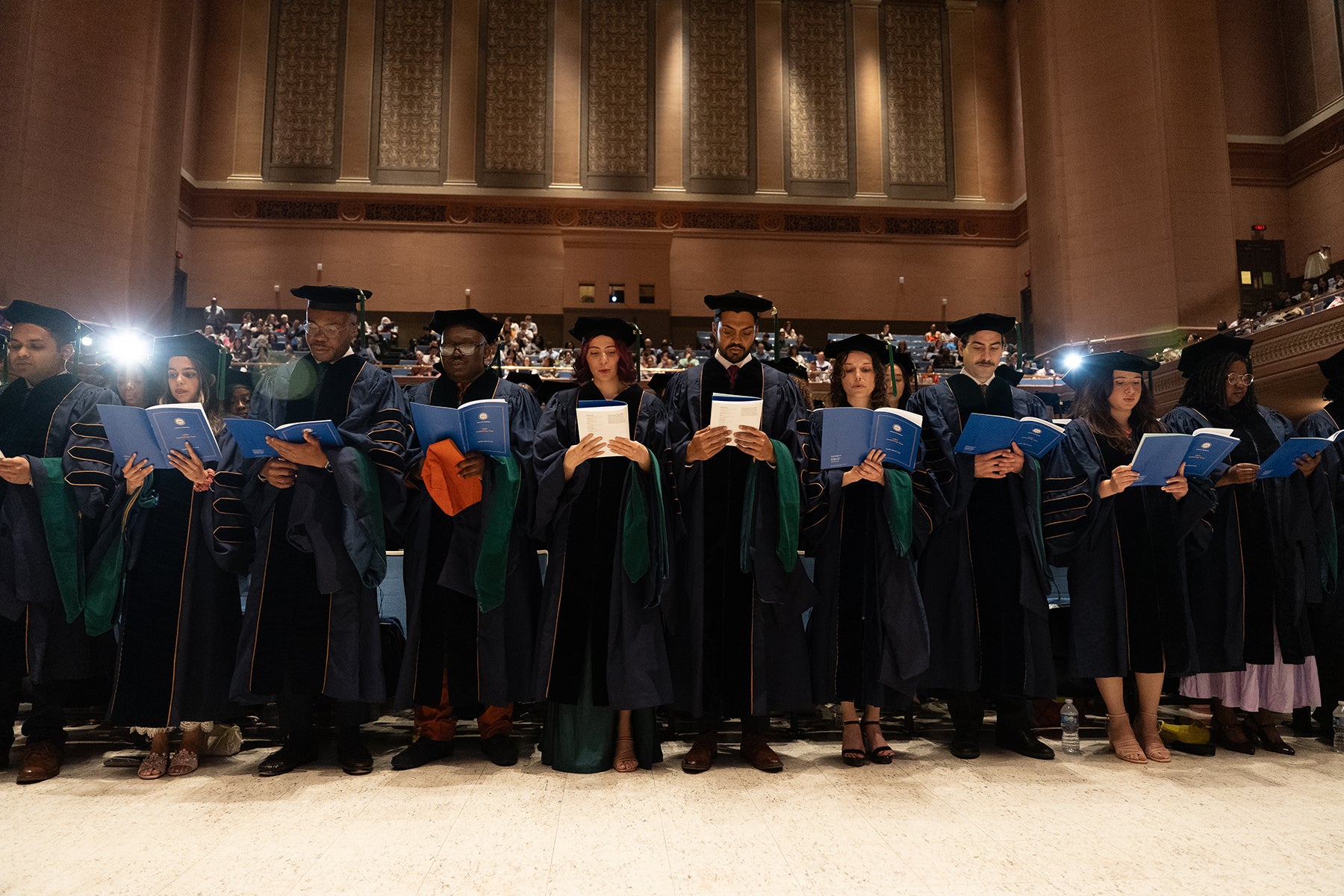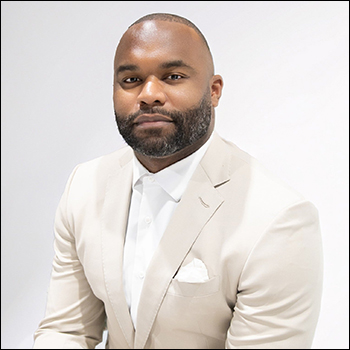Congratulations, Graduates!

The University of Pittsburgh School of Medicine’s 138th Diploma Day ceremony was held on Sunday, May 18, 2025. The school conferred 140 medical degrees, 66 doctoral degrees, 77 master’s degrees and 18 certificates.
View the slideshow of photos presented at Diploma Day 2025.
Relive the day by watching the livestream, and follow the ceremony with the Diploma Day program.
Keynote Speaker
 |
Myron Rolle, MD, MSc Pediatric Neurosurgery Fellow at Johns Hopkins All Children’s Hospital Chairman and Founder of the Caribbean Neurosurgery Foundation Former NFL Player |
Q&A: How commencement speaker Myron Rolle made it to the NFL and the OR
By Andrew Doerfler
In 2008, Myron Rolle was coming off a banner year as a Florida State University football player. His junior season as a safety earned him All-American and All-ACC honors, a finalist nod for the Lott Trophy honoring both athletic abilities and personal character, and plenty of interest from NFL scouts.
But Rolle’s ambitions didn’t solely lie on the football field. From a young age, he aspired to both make the NFL and become a neurosurgeon. And as he was contemplating his next step, he was offered a Rhodes Scholarship to study medical anthropology at Oxford University—an opportunity he felt would make him a more well-rounded physician in the future. Rolle accepted the scholarship, putting his gridiron dreams on hold.
“If I had to make it tomorrow, I’d make the same decision,” Rolle says.
Although he believes the move damaged his draft stock, he was still selected by the Tennessee Titans in 2010. He later spent time with the Pittsburgh Steelers before making the jump to medical school. Now an MD and a neurosurgery fellow at Johns Hopkins All Children’s Hospital preparing to become an attending neurosurgeon at Nemours Children’s Hospital in Orlando, Florida, Rolle says people often tell him that his story has inspired the young people in their lives.
Rolle will serve as the commencement speaker at the University of Pittsburgh School of Medicine’s Diploma Day on Sunday, May 18. In an interview, he shared some takeaways from his journey.
What do you think gave you the confidence to stick with both of your ambitions over the years?
I give a lot of credit to my parents. They came from the Bahamas and wanted me and my four brothers to achieve excellence in this country. When they put sports in front of me, they allowed me to pursue that with all the ferocity in my body. Around middle school, I started to say, “OK, I can probably make a career out of this and get to the NFL if I continue to work hard.” I had two older cousins, Samari and Antrel Rolle, who played in the NFL, too. So, we were no strangers to what it takes to become a pro ball player.
And as far as academics are concerned, reading was huge for me. Reading Ben Carson's book “Gifted Hands” opened my eyes to the fact that not only can I be a pediatric neurosurgeon but a Black pediatric neurosurgeon who thinks about the community and wants to extend his platform beyond the operating room and into the lives of people who need it the most.
What from your experience in athletics have you applied to your medical ambitions?
Discipline, focus, hard work, communication. In the operating room, communicating to figure out how to optimize this setting for the most important person in the room—the patient—is critical.
Mitigating pressure, being coachable and knowing how to adapt and adjust [are also important to both fields]. When COVID hit, I went from being a brain surgeon to being an ER doctor, essentially. I had to learn all these different skills that I did not go into a Mass General Hospital neurosurgical residency to do. Now I was doing something completely different, but that’s just like I did when a game plan changed from playing man to playing zone in the second half.
What advice do you have for soon-to-be residents who have passions beyond medicine that they want to maintain in their lives?
I think the days of being in the hospital for 72 straight hours, not sleeping and not doing anything but the work—those days are antiquated. I think hospital systems, hospital care teams, families, even patients expect their providers to have a more robust and holistic experience of life that allows them to connect on a deeper level.
For me, football, sports and the community initiatives that I do, that fills me up and that makes me feel like I am the Myron Rolle that my parents expect, the Myron Rolle that my mentees expect, the Myron Rolle that my God has laid out. And if I stripped these other aspects of my life away, then I would feel empty and not whole. And I want to be whole for my patients.
So, for the young graduates who will go on to save many lives, know that you have to fill your cup up with the experiences that give you purpose and allow all of that to help you become a better provider, a more patient-centered provider.
You released an autobiography a few years ago, “The 2% Way: How a Philosophy of Small Improvements Took Me to Oxford, the NFL, and Neurosurgery.” What was the message you wanted to share with the book?
“The 2% Way” is an ideology that I picked up from my football coach at Florida State University, Mickey Andrews. It speaks to incremental improvements daily toward achieving a goal. If you add up all those small wins, you'll be a better version of yourself, with your trajectory being uplifted and upscaled. And our coach challenged us every day to get a little better at our back pedaling, our ability to high-point catch the football, our ability to tackle or to disguise blitz packages.
I love the 2% way because it quiets down the background noise. It doesn't make us feel like we need to win the world tomorrow if we just have a small gain today and another small gain tomorrow.
And six months later or a year later, we'll see that we have made strides ahead. We have taken the sort of steady approach toward becoming a more proficient leader, a better communicator, a better son or daughter, a more prolific athlete, a more technical surgeon, or whatever it is.
As you’re preparing to return to Pittsburgh, are there any memories that stand out from your time with the Steelers?
I’m still friends with many of my former teammates—Troy Polamalu, Ryan Clark, Mike Taylor, James Farrior, Ramon Foster. The list goes on.
You could tell the Steelers organization is a family. A lot of former players will come back just to practice and hang around the facility. You got to see Mel Blount, you got to see Franco Harris, rest in peace, and a few other guys who always stayed close to the team and let us younger players feel like we're a part of something bigger than just our current roster. Pittsburgh had a different sort of profundity to its football love and its culture. That not only was within the locker room and the team but also spread to the whole community.
But my experience in Pittsburgh wasn't just with the Steelers. I actually did a sub-internship at UPMC with the neurological surgery department in my fourth year of medical school.
It was the hardest internship I've ever done. I was like, “These guys don’t stop.” I was impressed by the Pittsburgh residents on how well they handled not only complex cases but the volume of complex cases. Paul Gardner and Dade Lunsford—they are spectacular neurosurgeons with whom I remain close to this day.
Anyone who’s willing to work, willing to learn from the best and not be sheepish about getting their hands dirty and getting thrown from the frying pan into the fire, then UPMC was the right place to be.
—Interview has been condensed and edited for clarity.
